Movie Review – RoboCop (1987)
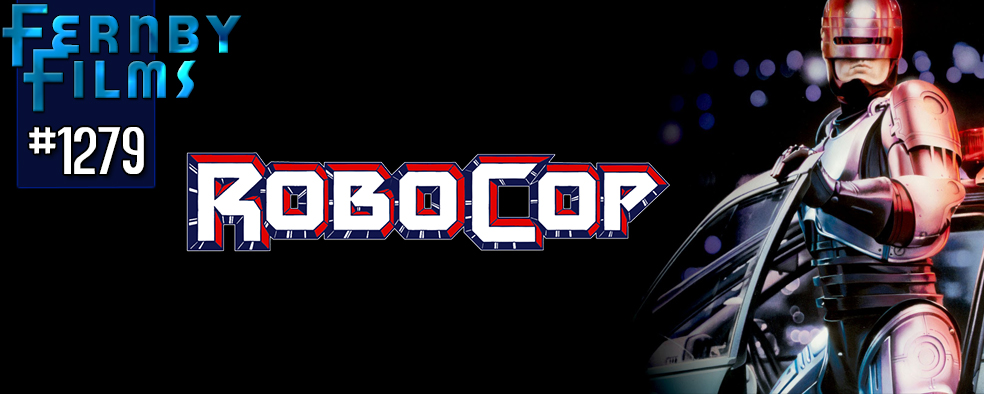
Director : Paul Verhoeven
Year Of Release : 1987
Principal Cast : Peter Weller, Nancy Allen, Ronny Cox, Kurtwood Smith, Miguel Ferrer, Dan O’Herily, Paul McCrane, Ray Wise, Jesse D Goins, Calvin Jung, Michael Gregory.
Approx Running Time : 101 Minutes
Synopsis: In a dystopic and crime-ridden Detroit, a terminally wounded cop returns to the force as a powerful cyborg haunted by submerged memories.
******
It’s so utterly painful to me that I have to type the “(1987)” after the title of this film. My thoughts on the 2014 remake of RoboCop, which you can skim-read here, remain intact, and having recently rewatched the original film (Director’s Cut, no less) on BluRay I’m inclined to reappraise my score for that dog turd even lower. RoboCop – henceforth the original – is a cinematic tour-de-force of subtext, political commentary, social deconstruction and all-round bad-assery wrapped up in Paul Verhoeven’s assaultive violence and dynamism. The man responsible for giving us Basic Instinct, Starship Troopers, Hollow Man and – most blessedly, Showgirls – delivers a scathing indictment on corporatisation and the loss of humanity in technological advancement, with RoboCop remaining one of the best sci-fi films to come out of the 80’s and a film so juiced up on itself it’s a wonder it even got made.
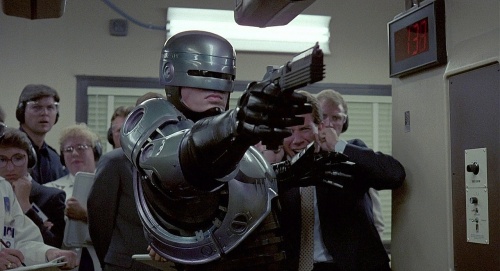 Violent, angry, terrifyingly prescient and almost entirely wry, Verhoeven’s RoboCop is magnificently operatic cinema at its most vulgar. Peter Weller, who spends the majority of the film encased in the titular robotic armour and sporting the best tech 1980’s futurism can envision, plays Alex Murphy, a Detroit police officer in a near-future America. Newly transferred to the city’s most violent precinct, Murphy is paired with Officer Lewis (Nancy Allen), before promptly being murdered by drug kingpin Clarence Boddicker (Kurtwood Smith) in a botched capture mission. Murphy’s body is taken to OmniCorp, the company assigned to reinvigorate the flailing Detroit, where his mind is wiped clean and uploaded into the constructed body of a cyborg – RoboCop – who is presented as a new way of lowering crime in the city. However, RoboCop begins to have flashbacks of his death, and begins to hunt down Boddicker’s gang, which leads him all the way up to crooked OmniCorp boss Dick Jones (Ronny Cox). As he juggles his own innate humanity, Murphy’s emotional flux threatens to weaken his ability to execute his programming – leaving OmniCorp with no option but to replace him.
Violent, angry, terrifyingly prescient and almost entirely wry, Verhoeven’s RoboCop is magnificently operatic cinema at its most vulgar. Peter Weller, who spends the majority of the film encased in the titular robotic armour and sporting the best tech 1980’s futurism can envision, plays Alex Murphy, a Detroit police officer in a near-future America. Newly transferred to the city’s most violent precinct, Murphy is paired with Officer Lewis (Nancy Allen), before promptly being murdered by drug kingpin Clarence Boddicker (Kurtwood Smith) in a botched capture mission. Murphy’s body is taken to OmniCorp, the company assigned to reinvigorate the flailing Detroit, where his mind is wiped clean and uploaded into the constructed body of a cyborg – RoboCop – who is presented as a new way of lowering crime in the city. However, RoboCop begins to have flashbacks of his death, and begins to hunt down Boddicker’s gang, which leads him all the way up to crooked OmniCorp boss Dick Jones (Ronny Cox). As he juggles his own innate humanity, Murphy’s emotional flux threatens to weaken his ability to execute his programming – leaving OmniCorp with no option but to replace him.
If you watch it at face value, RoboCop is essentially a sci-fi thriller offering plentiful violence and an assortment of highly effective action sequences. It could be enjoyed purely as an action film and nothing else, and there’s absolutely nothing wrong with that. RoboCop is a terrific action thriller and a film that achieves an incredibly impressive kill ratio that might even stump the great John Woo. However, as is the case with nearly all Paul Verhoeven’s films, RoboCop is a lot headier and jaw-droppingly salacious in inserting subtext and commentary wherever, and whenever, it can. The excess of the 80’s is grafted onto RoboCop’s media-saturated cacophony of greed, corruption and the Almighty Dollar. The breakdown of humanity is examined in Murphy’s search for his own following his murder, a carefully suggestive diatribe against the melding of man and machine. The nature of humanity – both good and bad – is examined in the diametrically opposed Boddicker (Kurtwood Smith would have made an amazing Joker) and Murphy (Weller, proving his acting chops in an utterly soulful role, even buried beneath the film’s dynamite practical visual effects) and Verhoeven’s beefed-up political and corporate antagonism once again provide an orgy of commentary between the bullets and the blood.
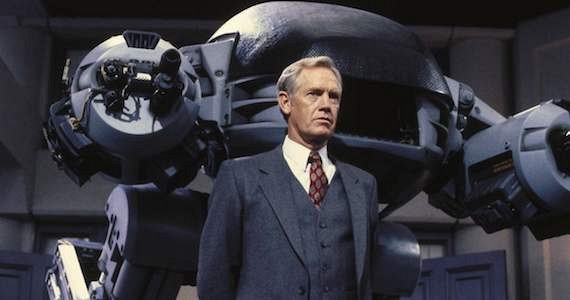 Yes, RoboCop is one of those films where you can choose to watch it as simply and mindlessly as you’re able, or dig deep into every facet of this utterly fascinating and stylistic film. Verhoeven plays up our expectations of corporate American greed, where human life is played off against shareholder profit (ugh), and even though the film was made in the mid-80’s, it works just as well now (maybe even better) than it did even back then, at the height of “greed is good” prosperity. The plot device of ED209, performed as a stop-motion effect by legend Phil Tippett, is representative of Big American Muscle, kinda like the muscle cars Detroit pumped out to fuel the car industry of the time, an industry now almost extinct in that city. The film’s portrayal of an insidious media influence, propagandist and reprehensibly complicity, has echoes in his later film Starship Troopers, although lacking the militaristic throughline, obviously.
Yes, RoboCop is one of those films where you can choose to watch it as simply and mindlessly as you’re able, or dig deep into every facet of this utterly fascinating and stylistic film. Verhoeven plays up our expectations of corporate American greed, where human life is played off against shareholder profit (ugh), and even though the film was made in the mid-80’s, it works just as well now (maybe even better) than it did even back then, at the height of “greed is good” prosperity. The plot device of ED209, performed as a stop-motion effect by legend Phil Tippett, is representative of Big American Muscle, kinda like the muscle cars Detroit pumped out to fuel the car industry of the time, an industry now almost extinct in that city. The film’s portrayal of an insidious media influence, propagandist and reprehensibly complicity, has echoes in his later film Starship Troopers, although lacking the militaristic throughline, obviously.
Verhoeven has publicly stated that he saw RoboCop/Murphy as a Christ-figure, a redemption journey following a brutal killing (the scene where Boddicker and his gang execute Murphy is both violently sickening and garishly sadistic, which is the intent of Verhoeven to upset the audience). The emotional arc of Murphy is one of redemption against Boddicker, which means Boddicker needs to be a nigh irredeemable force of evil on which to balance the plot. Kurtwood Smith’s snarling, leering performance is one for the ages, his Boddicker a deliciously snarky individual driven purely by greed and chaos. Reflecting on the film, it’s eerie how similar both this role and Heath Ledger’s Joker feel, almost cinematic blood-brothers of sorts; Boddicker’s easily one of the best screen villains of the decade, lacking compunction or even a bases sense of empathy – he’s evil, through and through.
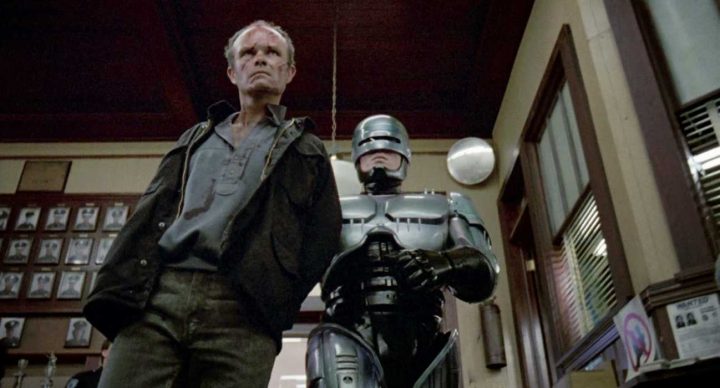 Against him, Weller’s Murphy is the redemptive figure, a born-again hero offering salvation against the corrupting sin of Detroit’s bowel-movement criminality. Verhoeven’s depiction of Murphy as such isn’t subtle, really, although watching RoboCop slice through a drug factory butchering criminals with his enormous handgun is a gleeful take-down of heroic expectations. It’s a contrast of violence begetting more violence. Murphy’s violent death, RoboCop’s violent “birth”, and the conflict between the criminals and RoboCopy’s one-man mission, is a case of necessary evils in order to protect the innocent (to steal a line from the film) hidden by a curtain of bludgeoning death and destruction. Weller, with the little face-time he has beyond the robotic mask he wears throughout, offers a moving humanist performance, giving the stoic, programmed-to-obey Robo an undercurrent of raw humanity, seething, struggling, just below the surface.
Against him, Weller’s Murphy is the redemptive figure, a born-again hero offering salvation against the corrupting sin of Detroit’s bowel-movement criminality. Verhoeven’s depiction of Murphy as such isn’t subtle, really, although watching RoboCop slice through a drug factory butchering criminals with his enormous handgun is a gleeful take-down of heroic expectations. It’s a contrast of violence begetting more violence. Murphy’s violent death, RoboCop’s violent “birth”, and the conflict between the criminals and RoboCopy’s one-man mission, is a case of necessary evils in order to protect the innocent (to steal a line from the film) hidden by a curtain of bludgeoning death and destruction. Weller, with the little face-time he has beyond the robotic mask he wears throughout, offers a moving humanist performance, giving the stoic, programmed-to-obey Robo an undercurrent of raw humanity, seething, struggling, just below the surface.
As the corporate overlord pulling the strings of both RoboCop and Boddicker, Ronny Cox’s arrogant Dick Jones is as slimy and bull-headed as they come. His boardroom battle with upstart fellow OmniCorp douchebag Bob Morton (Miguel Ferrer, chewing the scenery and cocaine on hooker tits with aplomb!) is sarcastically ironic considering the deathmatch-style corporate win-at-all-costs mentality pervading Wall Street at the time. The film’s villainy is multi-faceted moreso than the hero is heroic, which is strange – Verhoeven delights in building up the antagonism as insurmountable, which merely adds weight to Murphy’s arc as the hero – but a hero is only as good as his villain. RoboCop has some terrific villains. Nancy Allen’s Murphy, as a vaguely Mary Magdalene-esque character, mourns Murphy’s death and celebrates his return, aiding him in finding his lost humanity. Allen is solid but her role is minimal in the end, as are all the female roles here (most of the women in the film are either hookers, bimbos or arm-candy, which kinda dates the film but feels genuine unto itself, if that makes sense) but the strong leading roles work well enough without femininity to balance them.
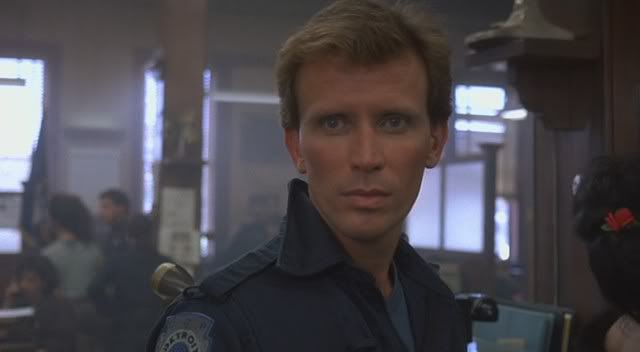 One of the things I discovered this time that I’d never considered was just how simplistic the film is. This film doesn’t wear its complex themes and subtext overtly, and Verhoeven’s ideas and assessment of Americanism of the day come from ironic humour – the audience may be laughing with the film, but out the back Verhoeven – through this film – is laughing at the audience. It’s a distinct difference that, with mature reflection, becomes more than humorous in retrospect. Audiences gleefully anticipating the next body-tearing gun battle or destructive explosion are the very people Verhoeven (and screenwriter Ed Neumeir) is making his point about, although the film’s “obviousness” skews this in such a way as it’s entirely un-obvious. Nobody is expecting such scathing thematics in a violent, excessive, gloriously malignant story like this. The dialogue is singularly pulp, delivered with cheesy 80’s snarls by the cast who all feel about ready to pop some ‘roids and go on a punching spree, the violence is over-the-top to the point of hilarious, and the action sequences feature a preponderance of cursing and overdubbed gunfire effects; RoboCop is a product of its time, raging against the product of its time, and blasting the very people who made the 80’s the time it was.
One of the things I discovered this time that I’d never considered was just how simplistic the film is. This film doesn’t wear its complex themes and subtext overtly, and Verhoeven’s ideas and assessment of Americanism of the day come from ironic humour – the audience may be laughing with the film, but out the back Verhoeven – through this film – is laughing at the audience. It’s a distinct difference that, with mature reflection, becomes more than humorous in retrospect. Audiences gleefully anticipating the next body-tearing gun battle or destructive explosion are the very people Verhoeven (and screenwriter Ed Neumeir) is making his point about, although the film’s “obviousness” skews this in such a way as it’s entirely un-obvious. Nobody is expecting such scathing thematics in a violent, excessive, gloriously malignant story like this. The dialogue is singularly pulp, delivered with cheesy 80’s snarls by the cast who all feel about ready to pop some ‘roids and go on a punching spree, the violence is over-the-top to the point of hilarious, and the action sequences feature a preponderance of cursing and overdubbed gunfire effects; RoboCop is a product of its time, raging against the product of its time, and blasting the very people who made the 80’s the time it was.
Verhoeven’s RoboCop is everything the 2014 RoboCop wasn’t – smart, crackling with violent energy, deliciously skewering popular social mores and ironically excessive as the era in which it was born. It’s a film conveying all manner of thinking about corporate structure, the dehumanising of American society, the idea of what it means to be human, and the pervasive nature of the media and influence via exposure. It does it whilst making you grin wildly at the bullets, blood and bodies splaying across the screen, and it knows you are while it’s doing it.


Terrific piece Rodney. RoboCop's many layers have made my appreciation of it evolve over the years since first seeing it as a kid. But in all those years not once have I ever thought it less than fantastic. Your thoughts on the villains is a reminder why the film has such a powerfully disturbing undertone – it's that most people in the film are bad. RoboCop is the white knight in a sea of villains.
My recent post “Extraordinary” Doc “Magnus” About Chess Prodigy Magnus Carlsen To Hit UK Cinemas November 25
Agreed, Dan. RoboCop remains the shining light in a society riddled with corruption, violence and the very worst of human nature. If the film has any weakness, it's that Murphy's humanity isn't developed enough at the opening before he becomes RoboCop, but this is a minor quibble that comes from millennial appreciation and not from an of-the-era narrative foundation.
"…you can choose to watch it as simply and mindlessly as you’re able, or dig deep into every facet of this utterly fascinating and stylistic film."
For me, this is the absolute key. It works on so many levels and pulls no punches on any of them. Love your assessment of Kurtwood Smith's performance. He was definitely someone we love to hate. Great review.
Thanks mate! I really loved this film as a kid (mainly for the action) and as an adult I can now appreciate its many layers of subtext. A marvellously prescient film dressed up as an action thriller.
YES! I can't possible tell you how many times I watched this growing up. So many classic lines and I just love Clarence Boddicker. Classic villain.
My favourite part was always the acid-burned henchman. LOL kersplat!
I'll admit it, I haven't seen Robocop. At least I also haven't seen Robocop 2014.
Oh dude. I think this is something you need to remedy as soon as possible.
Except for the Robocop 2014 bit.